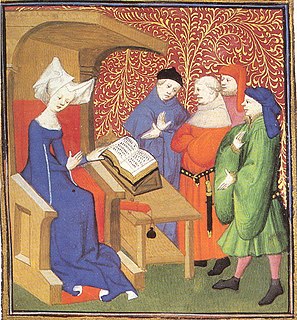A Quote by Karl Popper
We should realize that, if [Socrates] demanded that the wisest men should rule, he clearly stressed that he did not mean the learned men; in fact, he was skeptical of all professional learnedness, whether it was that of the philosophers or of the learned men of his own generation, the Sophists. The wisdom he meant was of a different kind. It was simply the realization: how little do I know! Those who did not know this, he taught, knew nothing at all. This is the true scientific spirit.
Related Quotes
No matter how much we may study, it is not possible to come to know God unless we live according to His commandments, for God is not know by science, but by the Holy Spirit. Many philosophers and learned men came to the belief that God exists, but they did not know God. It is one thing to belief that God exists and another to know Him. If someone has come to know God by the Holy Spirit, his soul will burn with love for God day and night, and his soul cannot be bound to any earthly thing.
But I still wonder how it was possible, in those graceless years of transition, long ago, that men did not see whither they were going, and went on, in blindness and cowardice, to their fate. I wonder, for it is hard for me to conceive how men who knew the word "I," could give it up and not know what they lost. But such has been the story, for I have lived in the City of the damned, and I know what horror men permitted to be brought upon them.
We've learned that women can and should do 'men's jobs,' for instance, and we've won the principle (if not the fact) of getting equal pay. But we haven't yet established the principle (much less the fact) that men can and should do 'women's jobs': that homemaking and child-rearing are as much a man's responsibility, too, and that those jobs in which women are concentrated outside the home would probably be better paid if more men became secretaries, file clerks, and nurses, too.
Every intellectual has a very special responsibility. He has the privilege and the opportunity of studying. In return, he owes it to his fellow men (or 'to society') to represent the results of his study as simply, clearly and modestly as he can. The worst thing that intellectuals can do - the cardinal sin - is to try to set themselves up as great prophets vis-à-vis their fellow men and to impress them with puzzling philosophies. Anyone who cannot speak simply and clearly should say nothing and continue to work until he can do so.
The reason why the simpler sort are moved with authority, is the consciousness of their own ignorance; whereby it cometh to pass that having learned men in admiration, they rather fear to dislike them than know wherefore they should allow and follow their judgments. Contrariwise with them that are skilful authority is much more strong and forcible; because they only are able to discern how just cause there is why to some men's authority so much should be attributed.
men have their cake and get to eat it too, for while they decree themselves as representative of humanity, women who argue that men are not, are simply showing how little they know! And when men's standards are defined as human standards, then women who assert that women are different, demonstrate how 'inhuman' they are. It is a real 'Catch 22.
The important thing is not so much that every child should be taught, as that every child should have the opportunity of teaching itself. What does it matter if the pupil know a little more or a little less? A boy who leaves school knowing much, but hating his lessons, will soon have forgotten all he ever learned; while another who had acquired a thirst for knowledge, even if he had learned little, would soon teach himself more than the first ever knew.






































